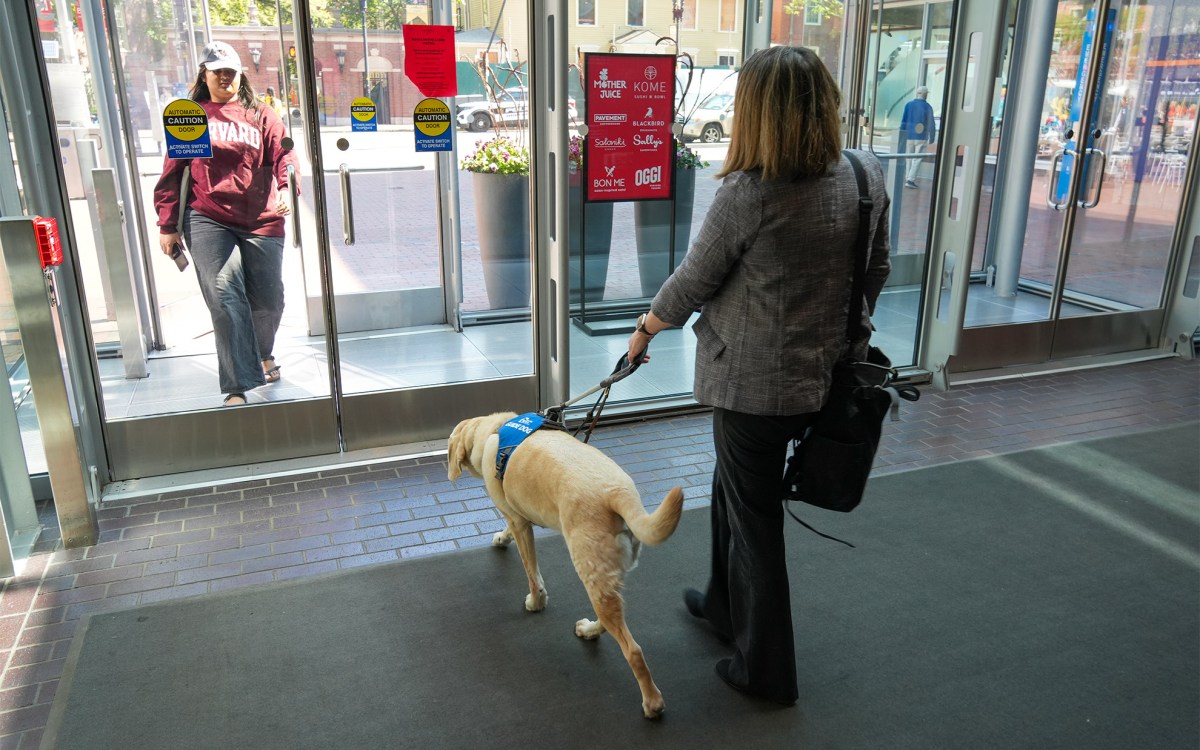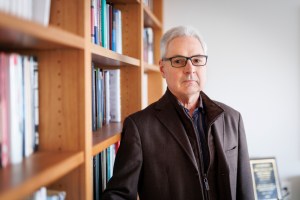Campus & Community
-

What’s the greatest love song of all time?
Faculty and administrators tell you theirs
-

Of different faiths, but connected by belief
Community members gather to explore identity, spiritual experience at first ‘Across This Table’ interfaith dinner
-

Batman returns — to accept his Pudding Pot
Michael Keaton feted as Hasty Pudding’s Man of the Year, 30 years after first invite
-

Funding innovative approaches to belonging
Supported by grants from the Culture Lab, four projects aim to strengthen belonging through listening, discussion, art, and representation
-

Class of 2001 elects Alejandra Casillas as chief marshal of alumni
Physician and health equity leader to serve in time-honored role
-

A second shot at Olympic glory
Battle-tested current, former students return to Winter Games
-
Harvard College Library is going green
The changes may not be immediately evident, but little by little, Harvard College Library (HCL) has been “going green” for years, even before the University’s newest commitment to sustainable practices.
-
‘Ed Portal’ builds bridge of learning for area children
When she grows up, 7-year-old Carley Daly wants to be “an animal doctor” who takes care of dolphins. As she explained her coming profession: “They’re partly scientists.”
-
Community Gifts finds food at the top of wish list this holiday season
That’s the magic number for The Greater Boston Food Bank’s (GBFB) annual Turkey Drive, where just $15 provides a meaty turkey to families across eastern Massachusetts for the holiday. Yet with winter swiftly approaching, Thanksgiving is just the threshold for the need the GBFB anticipates this season.
-
Radcliffe Institute appoints faculty leaders
In the Harvard community and worldwide, the Radcliffe Institute for Advanced Study is known for interdisciplinary ventures and for providing an ideal environment for incubating creative ideas and discoveries. To enhance its programs, the Radcliffe Institute has appointed several faculty leaders who will help spur new multidisciplinary collaborations in the arts, humanities, sciences, and social sciences.
-
Gift spurs public service efforts
At a late-afternoon reception in University Hall’s Faculty Room last week (Nov. 13), Harvard President Drew Faust and Harvard College Dean Evelynn Hammonds gratefully acknowledged a $1 million, multiyear gift from Charlotte Chen Ackert ’76 and David Ackert to the University’s Center for Public Interest Careers (CPIC).
-
HKS initiative includes new professorships, student support, and research
The John F. Kennedy School of Government at Harvard University is announcing an ambitious new initiative linking innovative governance to the world’s major social challenges.
-
Faculty Council
At its fourth meeting of the year on Nov. 12, the Faculty Council discussed committee service and considered a proposal for a new concentration in Human Developmental and Regenerative Biology. The council next meets on Nov. 26. The preliminary deadline for the Dec. 9 Faculty meeting is Nov. 24 at 9:30 a.m.
-
This month in Harvard history
November 1942 — A Harvard Alumni Association advertisement for the well-known Harvard chair (black with gold trim and mahogany-colored arms; weight: 28 pounds; advertised price: $13.50) yields the following historical details: “Many Harvard men know well this famous ‘Freshman’ chair which can be traced far back into the history of the college . . . the prototype of this comfortable ‘Freshman’ chair was found over 100 years ago in old University Hall then called ‘College Commons.’ ” (Quoted from “Harvard Alumni Bulletin,” Nov. 7, 1942)
-
Police reports
Following are some of the incidents reported to the Harvard University Police Department (HUPD) for the week ending Nov. 10. The official log is located at 1033 Massachusetts Ave., sixth floor, and is available online at http://www.hupd.harvard.edu.
-
In brief
Money Mondays offer help The Office of Human Resources will be offering a special series of “HARVie chats” on banking, benefits, investing, and other financial topics. Harvard staff are invited to visit http://harvie.harvard.edu/chats/upcomingchats.shtml to get information that may help in navigating through the current economic downturn.
-
Newsmakers
Klaber selected for summit J.D./M.B.A. student Andrew Klaber has been selected as one of 160 emerging leaders from 30 countries in the Asia-Pacific region who will gather at the Four Seasons Hotel in Tokyo for the Asia Society’s Third Annual Asia 21 Young Leaders Summit.
-
Gleason memorial set for Nov. 14
A memorial service is set for Andrew Gleason, professor emeritus of the Mathematics Department, who died Oct. 17. The service will be Nov. 14 at 2 p.m. in the Memorial Church, Harvard Yard. A reception will follow at Loeb House, 17 Quincy St., from 3 to 5 p.m.
-
Harvard China Fund announces fiscal year 2010 grant program
The Harvard China Fund, under the Office of the Provost, has announced its fiscal year 2010 grants program for Harvard faculty, programs, and Schools. The purpose of the fund is to support interdisciplinary research and teaching in and about China, focus Harvard’s considerable strengths toward tackling the challenges that China faces, and improve communication and collaboration between Harvard’s faculty and Schools, and Chinese universities and research institutes.
-
Student prizes awarded in Japanese Studies
The Reischauer Institute of Japanese Studies and Kodansha Publishers recently hosted the 14th annual Edwin O. Reischauer/Kodansha Ltd. Commemorative Symposium and the 13th annual awarding of the Noma-Reischauer Prizes in Japanese Studies. These prizes are given annually by Kodansha Publishers for the best essays written by Harvard University students on Japan-related topics.
-
Crimson embarrass Columbia in blowout
The rain held off over a cloudy Ohiri Field on Saturday (Nov. 8), but Columbia still felt the storm. The Crimson’s 6-1 rout of the Lions undoubtedly sent the message to the University of Pennsylvania Quakers that if they want this year’s title, Harvard will make them earn it when the two meet on Saturday (Nov. 15).
-
Sweet taste of victory
Nine seconds. Only nine seconds were left on the clock when Crimson defender Lizzy Nichols ’10 kicked the game-winning penalty shot to the back of the net in double overtime. The 109-minute-51-second thriller against Columbia on Saturday (Nov. 8) clinched the Ivy League title for Harvard, who started the day in a three-way-tie for first place with Columbia and Princeton.
-
Harvard’s roots: From dirt to display case
Just a year after being pulled from Harvard Yard’s soil, the bones, buttons, pottery shards, and type from the press that printed North America’s first Bible are cleaned up and on display in a new exhibit at Harvard’s Peabody Museum of Archaeology and Ethnology.
-
Living in the green zone at ‘Rock Hall’
“Rock Hall” — the nickname for John D. Rockefeller Jr. Hall at Harvard Divinity School (HDS) — looks just like what it is: a spare, elegant building in the Modernist tradition.
-
Fighting domestic violence: One way that Community Gifts helps others
Diane Rosenfeld, through her work at Harvard, has found a way to help many. Social justice and civil rights protection of domestic violence victims are at the core of Rosenfeld’s work, both as a lecturer at Harvard Law School (HLS) and as an activist with Jane Doe Inc., the Massachusetts Coalition Against Sexual Assault and Domestic Violence.
-
Eleanor and Miles Shore 50th Anniversary Fellowship Program for Scholars in Medicine
The Eleanor and Miles Shore 50th Anniversary Fellowship Program for Scholars in Medicine has announced the selection of more than 90 junior faculty members, researchers, and clinicians as fellows for the 2008-09 academic year. Fellows generally receive between $25,000 and $30,000 for one year.
-
Shore Fellowship affords breathing room
The weekend was hectic for physician Rhonda Bentley-Lewis: two full days of activities, including her son’s birthday party. Then came the trip to the emergency room, not to attend to a patient, but to Christian, the 11-year-old birthday boy, and his broken wrist.
-
HKS gives $10M boost to program
The John F. Kennedy School of Government at Harvard University will allocate an additional $10 million to an innovative program that trains emerging leaders from developing nations with the help of funds from the Ford Foundation. The announcement was made at the 50th anniversary celebration of the Edward S. Mason Program, which was held at the Ford Foundation in New York Nov. 5 and hosted by the foundation, Harvard Kennedy School, and Caroline Kennedy, daughter of the 35th president of the United States, for whom the School is named.
-
Sen. Edward Kennedy to receive honorary degree at December convocation
Sen. Edward Kennedy will receive an honorary degree from Harvard on Dec. 1 in a special convocation at Sanders Theatre. The honor is in recognition of Kennedy’s lifelong commitment to public service and his tireless efforts as a champion for a range of social issues including health care, civil rights, labor, employment, the environment, and education.
-
Gleason memorial set for Nov. 14
A memorial service is set for Andrew Gleason, professor emeritus of the Mathematics Department, who died Oct. 17. The service will be Nov. 14 at 2 p.m. in the Memorial Church, Harvard Yard. A reception will follow at Loeb House, 17 Quincy St., from 3 to 5 p.m.
-
HRES plans home-buying seminar
Harvard Real Estate Services is holding a home-buying seminar on Dec. 4 from noon to 1:30 p.m.
-
HUHS to offer flu vaccination clinics through November
Harvard University Health Services (HUHS) will conduct free vaccination clinics throughout November. The clinics will be open to the entire Harvard University community every Monday and Tuesday (noon-3 p.m.) at HUHS on the second floor of the Holyoke Center (Monks Library).
-
Gleason memorial set for Nov. 14
A memorial service is set for Andrew Gleason, professor emeritus of the Mathematics Department, who died Oct. 17. The service will be Nov. 14 at 2 p.m. in the Memorial Church, Harvard Yard.
-
Worldly Weissman Scholars talk trips
Neagheen Homaifar ’10 helped to create a financial literacy program for a microfinance bank in Mexico City, and Samantha Fang ’10 examined practices on trade and sustainable energy while writing articles for an international organization in Geneva.
-
Astronomy Department dedicates new telescope
A small knot of a dozen people gathered on the Science Center roof on Friday (Oct. 31) to officially dedicate Harvard’s latest teaching telescope, a 16-inch cassegrain telescope built by DFM Engineering in Colorado.
-
Sports briefs
Crimson tie 1-1 at Dartmouth, within one game of title; Men’s soccer stunned by Big Green, falls into a tie with Penn; Donato inducted into the Massachusetts Hall of Fame

